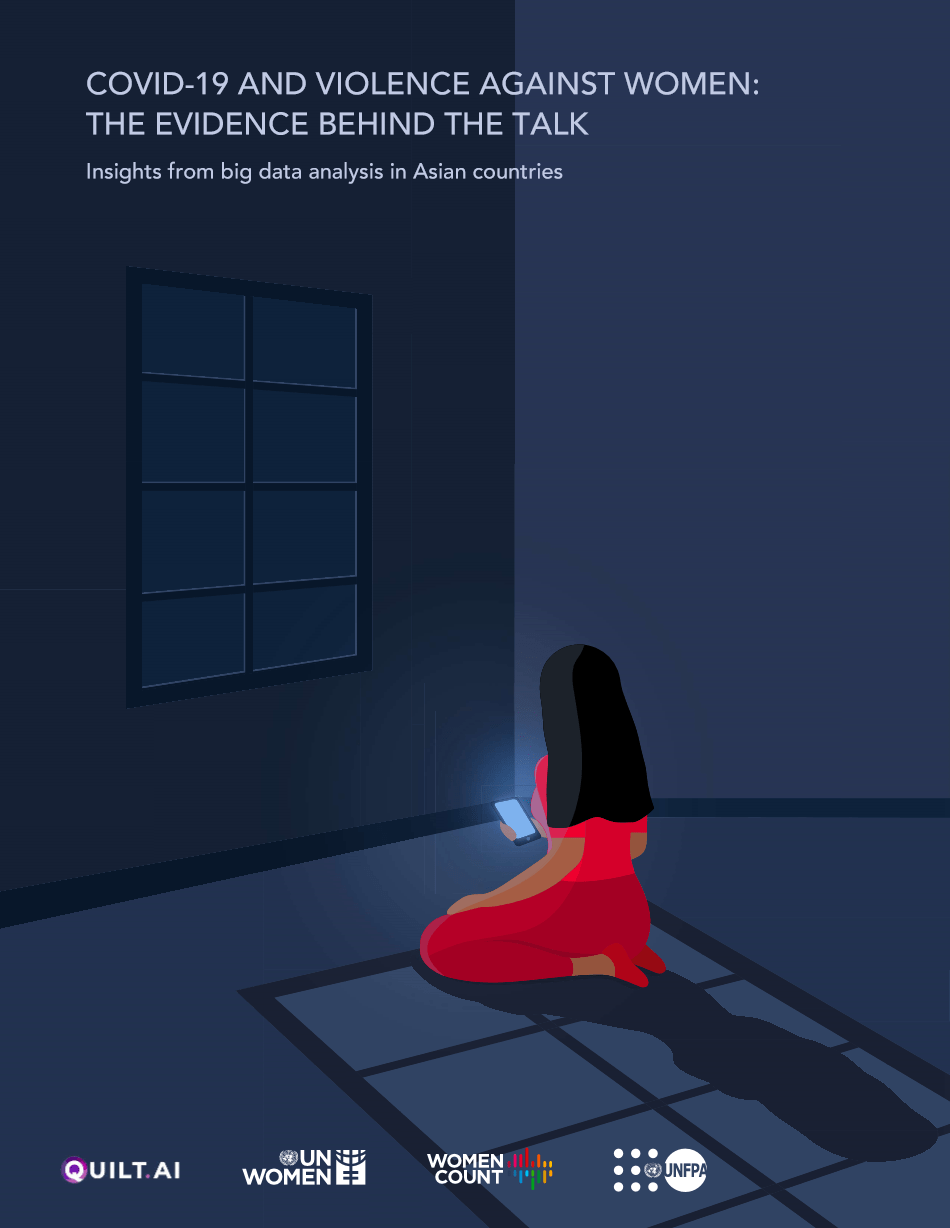FOR IMMEDIATE RELEASE
3 March 2021
Online searches and social media posts mirror ‘shadow pandemic’ of violence against women in Asia
Bangkok, Thailand – Big data analysis shows that Internet searches related to violence against women and help-seeking rose significantly during COVID-19 lockdowns in several Asian countries, buttressing evidence of the particular dangers faced by women confined to homes or restricted in their movements.
In response, government and private service providers should boost their online reach and engagement with survivors of violence, says the new report, COVID-19 and Violence against Women: The Evidence behind the Talk.
UNFPA and UN Women partnered with the analytics company Quilt.AI, to focus on eight countries: Bangladesh, India, Indonesia, Malaysia, Nepal, Philippines, Singapore and Thailand. The analysis spanned periods from September 2019 to November 2020 and covered about 20.5 million unique searches; 3,500 keywords on violence against women; 2,000 posts on Facebook, Twitter, YouTube and ShareChat; and the Facebook pages and social media posts of 32 service organizations.
The report says searches related to physical violence – including keywords such as “physical abuse signs”, “violent relationship”, and “cover bruises on face” -- in Malaysia, Philippines and Nepal increased 47 per cent, 63 per cent, and 55 per cent, respectively between October 2019 and September 2020. Searches using help-seeking keywords such as “domestic violence hotline” increased in almost all countries – including a 70 per cent rise in Malaysia. Online misogyny rose, including trolling, sexual harassment and victim-blaming. However, online support for survivors also increased as did campaigns by service providers.
The search analysis points at increasing concerns regarding partner violence – with queries on “violent husband” or “violent partner” comprising the bulk of searches related to violence against women in seven of the eight countries. And sexual abuse searches are also increasing, likely by the survivors of partner violence.
On social media, people expressed widespread frustration with the weakness of government responses to violence against women amid the COVID-19 pandemic, and preferred to settle cases outside justice institutions, which they do not trust, the analysis shows.
Targeted analysis also captured keywords pertaining to migrants and associated searches/posts to understand unique set of challenges that women and men migrants are facing during the COVID-19 pandemic. The analysis revealed that almost 80 per cent of searches in neighbourhoods with substantial migrant populations in three destination countries (Malaysia, Thailand and Singapore) are related to mental health – highlighting an increase in feelings of stress, depression, fear, anxiety and loneliness among migrant populations.
"The so-called ‘shadow pandemic’ of violence against women and girls under lockdown is widely recognized by now, and this analysis proves what we have long anticipated,” said Mohammad Naciri, Asia-Pacific Regional Director of UN Women. “This analysis of big data now gives us a better picture of exactly what different women need most urgently, and how all support agencies - government, private-sector, international organizations and civil society - can improve the ways they reach out to these groups,” Mr. Naciri added.
“The study clearly shows the crucial role digital platforms can play in helping address violence against women,” said Bjorn Andersson, UNFPA Asia-Pacific Regional Director. “It also underscores the urgent need to provide digital literacy skills to disadvantaged populations, to ensure access to potentially lifesaving online tools. Supporting women and girls impacted by the digital divide must be a priority for governments and partners as countries build back better in a post-pandemic world.”
END
Media Inquiries:
Roy Wadia, Regional Communications Adviser, UNFPA | +66 848 752 634 | wadia@unfpa.org
Montira Narkvichien, Regional Communications Specialist, UN Women | +66 81 668 8900 |
montira.narkvichien@unwomen.org
About UN Women
UN Women is the United Nations agency dedicated to gender equality and the empowerment of women worldwide.
About UNFPA
UNFPA is the United Nations’ sexual and reproductive health and rights agency, working worldwide to achieve zero maternal deaths, zero unmet need for family planning, and zero gender-based violence and harmful practices against women and girls.
Note to Editor
The report COVID-19 and Violence Against Women: The Evidence Behind the Talk can be downloaded here.



